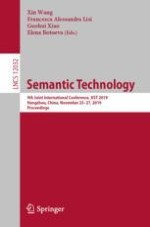2020 | OriginalPaper | Buchkapitel
Report on the First Knowledge Graph Reasoning Challenge 2018
Toward the eXplainable AI System
verfasst von : Takahiro Kawamura, Shusaku Egami, Koutarou Tamura, Yasunori Hokazono, Takanori Ugai, Yusuke Koyanagi, Fumihito Nishino, Seiji Okajima, Katsuhiko Murakami, Kunihiko Takamatsu, Aoi Sugiura, Shun Shiramatsu, Xiangyu Zhang, Kouji Kozaki
Erschienen in: Semantic Technology
Aktivieren Sie unsere intelligente Suche, um passende Fachinhalte oder Patente zu finden.
Wählen Sie Textabschnitte aus um mit Künstlicher Intelligenz passenden Patente zu finden. powered by
Markieren Sie Textabschnitte, um KI-gestützt weitere passende Inhalte zu finden. powered by
